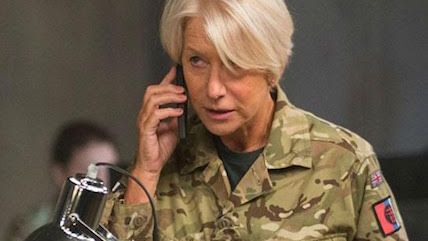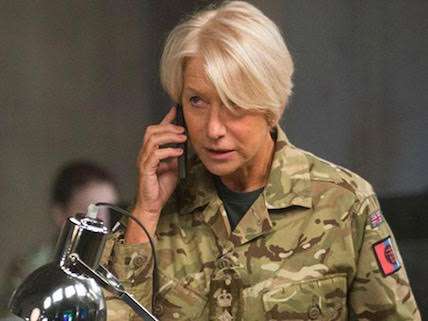Movie Review: Eye in the Sky
Helen Mirren in a tense military morality tale.


Eye in the Sky is a high-tech terror-war story with a covert mission. The movie exerts all the raw, gnawing tension you'd expect from an intelligence thriller; but at the same time it confronts us with a murky moral conundrum: can the killing of terrorists preparing to murder and maim dozens of innocent people justify the death of a single child as collateral damage? The filmmakers' unemotional examination of this question is likely to leave viewers on each side of it feeling implicated in its dark calculations.
The story begins in Kenya, where Al-Shabaab terrorists patrol the dusty streets of Nairobi, enforcing their demented version of Sharia law with barked threats and machine guns. In a house in a shabby walled compound, a group of top jihadis is gathering for purposes unknown.
Meanwhile, in England, at a military intelligence center in Surrey, Colonel Katherine Powell (Helen Mirren in a steely performance) is monitoring a camera feed from a U.S. drone high above the faraway compound. Two of the jihadis are on an American most-wanted list, and Powell's assignment, directing a group of special-forces infiltrators on the ground, is to capture them. Capture, not kill. So far, it's looking good. But when a mini-drone in the form of a small bird (an actual war-tech item, apparently) is maneuvered into the compound by a British undercover op (Barkhad Abdi), we see that the jihadis are preparing explosive vests to be strapped onto a pair of suicide bombers. The rules of military engagement suddenly shift: Powell's mission has now become a kill operation—or so she believes.
Powell has been on the line with the drone's pilot (Aaron Paul of Breaking Bad), who is monitoring the video feed at a U.S. Air Force base in Las Vegas. She's about to order him to blast a Hellfire missile into the compound when a little girl from the local community appears on the scene, setting up a table by the compound wall in order to sell loaves of bread baked by her mother. Powell's mission is suddenly more complicated: if she takes out the jihadis, the girl will surely also die.
Working from a script by Guy Hibbert, South African director Gavin Hood (X-Men Origins: Wolverine) and his ace editor, Megan Gill, never stop tightening the screws in depicting the frustration of military officers seeking a go-ahead to stop the jihadis from bureaucrats and politicians who are often more concerned with political and public-relations considerations.
In London, Powell's commander, General Frank Benson (the late Alan Rickman, purringly expert in his last screen appearance), is arguing for action from a group of Whitehall functionaries who are refusing to be won over. If the little girl is killed, they contend, the Brits and Americans will be crucified in the international press ("and revolutions are fueled by postings on YouTube," one of them says). But if the jihadis are allowed to proceed with their suicide slaughter, all of the blame will be on them—surely much to be preferred. (There's also another problem, raised by government lawyers: two of the jihadis hold British citizenship, and a third is American.)
As the jihadis' preparations continue, Benson's plea for authorization keeps getting kicked up the chain of command, where higher authorities prove time-consumingly difficult to track down. (The British Foreign Secretary is at an arms fair in Singapore; the U.S. Secretary of State is attending a ping-pong tournament in Beijing.) In the meantime, with the clock running out, the infuriated Colonel Powell is attempting some devious corner-cutting that will allow her to obliterate the compound without further ado.
It's hard to imagine how the cast could be much better. Mirren is entirely convincing as an officer of icy nerve and determination. Abdi—the Somalian actor nominated for an Oscar for his debut performance in the 2013 Captain Phillips—spikes the action with a sudden act of courageous improvisation. And nine-year-old first-timer Takow, a natural charmer as the endangered little girl, will surely find no shortage of further film work.
As intelligent as it is, the movie has none of the trappings of preening Deep Thought. Its globe-hopping structure helps whip the story along, even as its moral despair mounts. Director Hood has found a gripping way to pose important questions, for which neither he nor we can come up with any happy answers.


Show Comments (90)